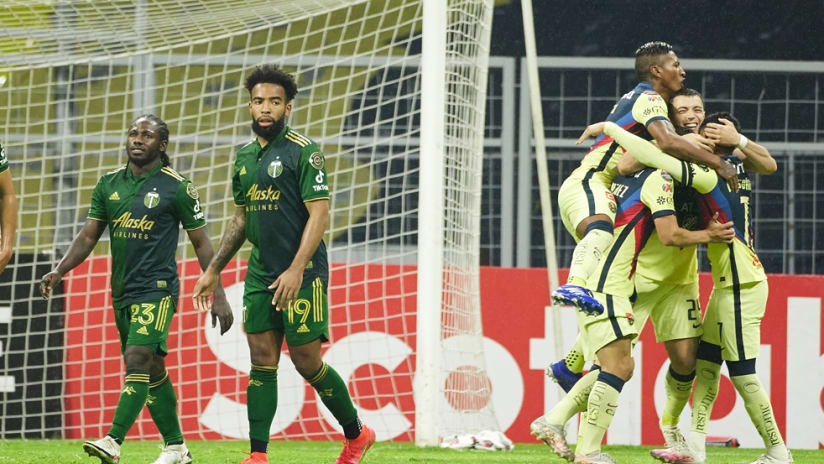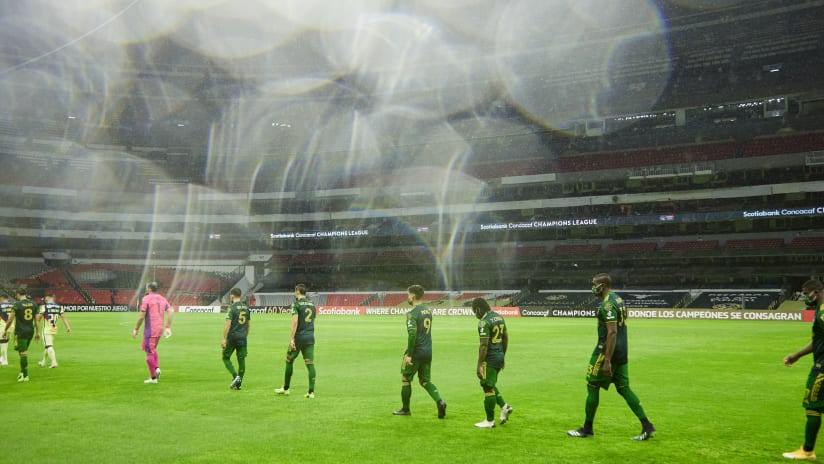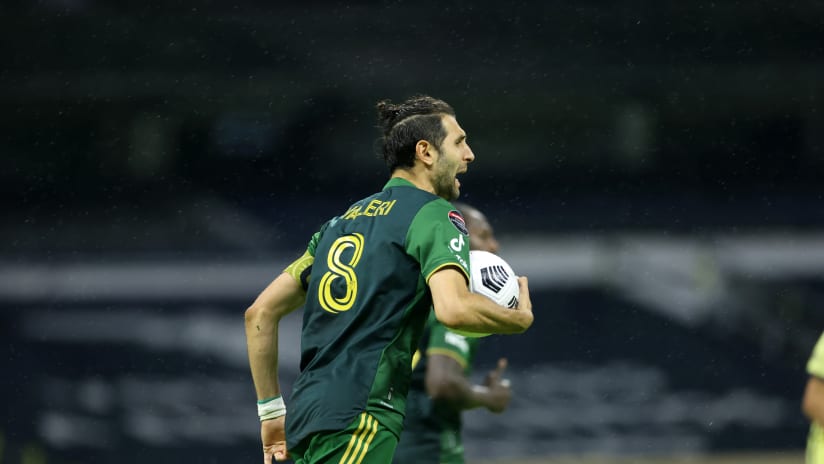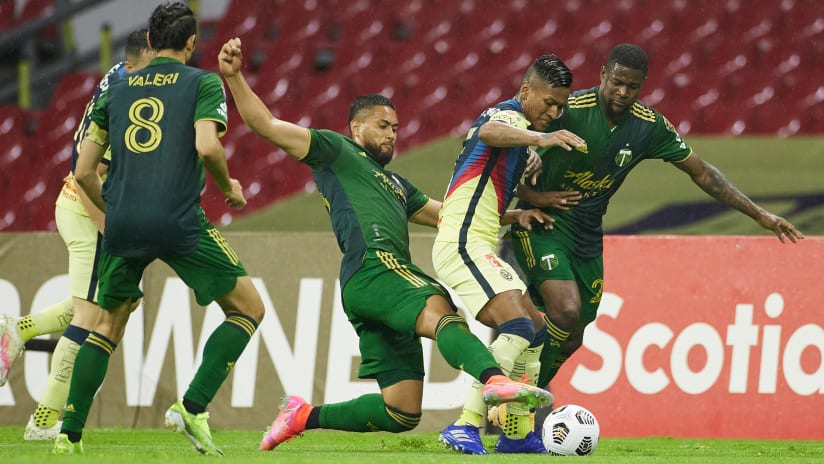MEXICO CITY — You could see the Portland Timbers’ players processing their lessons the moment Wednesday’s game was over. That processing probably started before the final whistle, but when the game was still live, everybody was still living off hope: hope that the team’s second-half play could bridge the gap; hope that the 3-1 gap in the game, and the 4-2 gap overall, could suddenly shrink, and then feel manageable. The Timbers were creating enough chances in the second half against Club América. A goal could come at any time.
“After the [game was] 2-1, we believed that we could achieve something,” Timbers head coach Giovanni Savarese said after the match. “One more goal could have put us through.”
There were the chances for forward Felipe Mora, who came out of halftime with solutions for attacking the space behind América’s defense. One of those attacks produced a penalty kick that was converted by Diego Valeri, who had multiple chances on goal of his own. Yimmi Chara turned on an early second-half ball and tested goalkeeper Guillermo Ochoa, while his older brother, Diego, was able to run onto an open shot from distance shortly after intermission. Though Portland was outscored in the second half, they had the better of play, which made it more painful when the game ended with América up, 3-1.
“I don't know how the guys felt but, in my case, I was very frustrated,” Valeri, the team’s captain, said afterward. “I was wishing to make the final in this [tournament]. It was very important for me … I was sad.”
This is where the lessons come after the 4-2 aggregate loss — the “what we could have done betters” over the team’s Concacaf Champions League quarterfinal matchup. There were some obvious ones. Over the first halves of the two-game series, Portland was outscored 2-0, limited to one shot, and never tested Ochoa. Over the second halves, the aggregate score was 2-2, with the Timbers outshooting América 17-14. Games have two halves, so Portland can’t ignore one in favor of the other, but the 90 minutes they played against Las Aguilas after halftime were telling. They were reasons for pride, but also a standard they needed for 180 minutes.
“In the first half, we were a little too stationary, trying to find the ball in behind,” midfielder Eryk Williamson said of Wednesday’s performance. “Ultimately, we weren’t sharp enough. Moving on, we know that have to execute in every game for 90 minutes.”
- IN PICTURES: Champions League in the rain at Azteca
There were also the two penalties the team gave up: one in Portland, one at Estadio Azteca. Both were conceded by left back Claudio Bravo. Both came when he was defending one-on-one. Bravo is still in his first months as a Timber, but it’s safe to say he’s unlikely to give up penalty kicks at the rate he did against América. Still, the two he conceded were important. Portland’s margin for error was always going to be small.
The biggest lesson, though, might be a little more obvious, especially if you follow competitions that use the two-leg, knockout-round format. With that model, each team gets a leg at home. Each team gets 90 minutes in an environment that favors them. América took advantage of that on Wednesday, giving themselves a plus-two edge at home. A week ago, Portland allowed the Eagles to leave on even footing.
In the second leg, Las Aguilas were more ruthless. They were better than a week ago. Though they may not have been the team that dictated play in the second half, but they were the team that scored the most goals. To the extent unfamiliarity hindered América at Providence Park, familiarity helped them at Azteca. They showed why you have to leverage your advantage at home, and the edge you earn when you get a good result on the road.
“It's unfortunate,” Savarese said, “because we knew that traveling here, we were going to find some challenges. If some things go a little bit our way, if they don't find the third goal and then we capitalized on some other chances that we had in the second half, maybe the story would have been different.
“They were better in the first half. You’ve got to give them the respect they deserve for what they did in the first half, but in the second half, I thought that we created good chances and put up a good fight. And unfortunately, now we're out and this is not what we wanted.”
Think back to last week at Providence Park. Yes, Portland struggled in the first half, just as they struggled over the first 45 minutes in Mexico City. But they generated enough second-half chances to produce more than one goal, and while that also was the same at Azteca, your home leg is where you’re supposed to make your mark. It’s where you need to leverage your advantages. It’s where you build a margin to protect against what usually happens on the road.
- #STATMAN THREE: Valeri reaches another benchmark with CCL goal
Perhaps that is why teams usually want the second leg at home. You have more knowledge. You know what needs to be accomplished. If you know you’ve got the last 90 minutes at home, you can hold your cards closer to the vest in leg one. Once the match changes venues, the leverage swings back to you.
That won’t be the only lesson Portland takes from their Champions League quarterfinal. There were mistakes to be avoided, chances to be converted. There was consistency to be had. More than anything, though, there was a chance to create room for mistakes, missed chances, and uneven moments in Mexico. Without that margin, the Timbers couldn’t overcome América in Mexico. The “could have done betters” won out, even if there were still positives to take from how Portland matched up.
“I think everyone that has seen the way we competed against a good team like Club América is going to know that we have a team that has the belief in achieving important things,” Savarese said. “[We are] a team that has an identity and a style of play that tries to maintain in matches like this and that is going to fight through all the time, even if you play against teams like Club América.
“We knew it was going to be difficult, but we have a belief in ourselves, and I think what we have to do now is have a good reflection of these two games and continue to move forward.”
Complete coverage — Timbers' night at Estadio Azteca:
- RECAP | Timbers lose in Mexico, eliminated in CCL quarterfinals
- HIGHLIGHTS | Valeri scores, Timbers fall at Club América
- POSTGAME, Savarese: "Now we have to continue to work"
- POSTGAME, Williamson: "Ultimately, we weren't sharp enough."
- FARLEY | Timbers left with frustrations, lessons after CCL ouster
- GALLERY | Champions League in the rain at Azteca
- #StatMan Three | Valeri reaches 200 combined goals, assists












